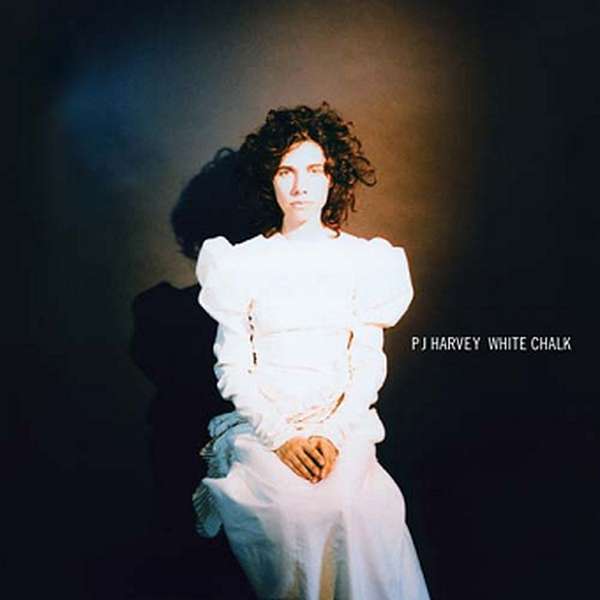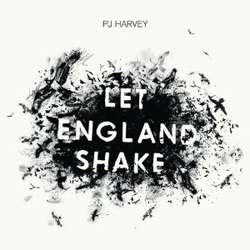Beginning with her 1992 debut album Dry, much has been made of Polly Jean Harvey seemingly reinventing herself with every release that followed. For anyone else, this would be a gimmick, a hook - thus making the work less than sincere. But the calculation ends with the realization that the music is more honest than most anything created by other artists. Each album is a fair representation of a specific period in the life of a woman called PJ. That is to say, each album represents how this particular woman was feeling at the time of writing the songs. It sounds simple doesn't it? Shouldn't it be?
Why is it then that Ms. Harvey is one of a very small handful of artists that write in this fashion? Think about it. Most every songwriter that you can think of may have different themes, tempos, and moods to their music and lyrics, but yet all their songs still sound similar - constrained within the frame of the artist's previous work.
PJ Harvey knows no such restraints. Each album has been a fully autonomous, organic entity all it's own. "Concept" albums, if you like - if the concept being referred to, is the artist's general mood at the time.
Dry - A celebration of a strong, self-assured yet still somewhat reticent woman with songs that were seemingly pent up inside her entire life and now given the opportunity to spew forth.
Rid of Me - The gloves are off with songs of rage, sexuality, and aggression that they almost seemed laced with testosterone rather than estrogen.
To Bring You My Love - An album of seduction with PJ drastically changing her look, and softening her touch to lure those poor bastards to the rocks.
Is This Desire? - Perhaps as an antidote to the misperceived strumpet of her previous album, Is This Desire? shows us her dark side. Scary sounds, electronically enhanced - an ugly, aural wall built up to shield us from the person underneath.
Stories From the City, Stories From the Sea - The wall comes crashing down. PJ is apparently in love and all seems right with the world. Her most accessible and personal album yet. First person narrative has never been more prevalent in her work.
Uh Huh Her - But all good things must come to an end. PJ is pissed off and wants everyone to know it. From "The Life and Death of Mr. Badmouth" to "Who the Fuck" to "The Darker Days of Me and Him," this is an angry album and as anger will always cloud judgment, this is also PJ's most uneven work to date with only a handful of tracks that make a deposit in the memory banks.
Throughout PJ Harvey's entire career, there has remained one common denominator, and that is strength. Even in the throws of love or hate, when most are at their weakest, there was strength.
White Chalk reveals a side to Polly not yet shown to the likes of us - vulnerability. And it's in that vulnerability that Harvey has given us her strongest album yet. Gone is the chaos of the first two albums. Gone are the lush arrangements of each successive album. This is an album stripped to the bone of a woman stripped to the skin of all pretense and presentation. A sparse, thirty-six minute offering of quiet, introspection and reflection. This is the PJ Harvey of want and longing.
Forgoing the comfort zone of her guitar, the piano dominates every song. While not as skilled a player of the ivories, the sparse (there's that word again) arrangements of the song lose nothing in their delivery. Re-recruiting producer Flood was a sound decision - the entire album sounds as if it were recorded in a Victorian mansion, furniture covered in sheets, sheets covered in dust. "Haunting" will most likely be the most commonly used word to describe this album when reviewed by my learned colleagues, and while it can be a term bandied around for the slightest of reasons, it is the only singular word that would best be used to summarize this work.
The ceiling is moving / Moving in time / Like a conveyor belt / Above my eyes
Every song has an ethereal quality to them that regardless of what you envision while listening, it will all be shrouded in mist. Put on "Silence" or the title track. You can almost smell the cool, damp air.
Vocally, the album is a departure as well - every whisper and falsetto wail almost has one thinking of someone other than Harvey delivering the prose. This is, after all, a strong, confident woman reduced to a woman of regret and atonement in "Before Departure" and regressed to a frightened, lonely little girl in "To Talk To You," her voice never sounding more fragile.
Being PJ Harvey, none of this can ever be mistaken for weakness, mind you. Just an all-too-brief glimpse into the mind of a spurned lover, a lonely granddaughter, and a frightened girl all trapped inside a very complex woman.


